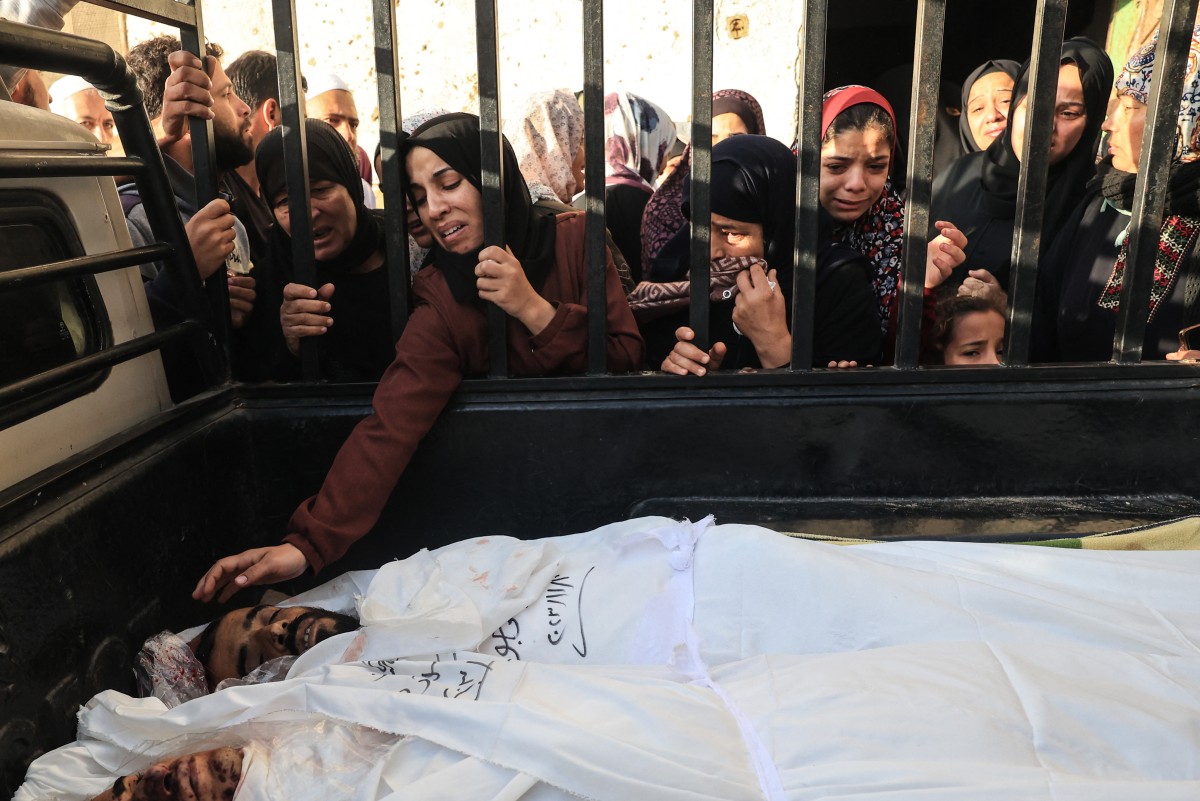Geneva, Switzerland — Israel is consistently blocking humanitarian convoys into northern Gaza, making it increasingly difficult to bring desperately needed fuel and other aid to hospitals there, the United Nations said Friday.
After planning aid missions to the north, UN agencies said their convoys were subjected to slow and unpredictable inspections and then a near-systematic refusal from the Israeli side to proceed.
“Operations in the north (are) increasingly more complicated,” Andrea De Domenico, head of the UN aid agency OCHA’s office in the occupied Palestinian territories.
Speaking from Jerusalem to a virtual press briefing, he described how detailed coordination was required with a network of checkpoints, and “the Israelis have systematically, or quasi-systematically, refused” to let them through.
In recent days, he said the agency had had three missions partially approved out of 21 requested.
Lucia Elmi, special representative for the UN children’s agency UNICEF in the Palestinian territories, also lamented that “we can’t get sufficient aid in”.
“The inspection process remains slow and unpredictable, and some of the materials we desperately need remain restricted, with no clear justification,” she said.
‘Inhumanity‘
De Domenico said the Israeli military was particularly wary about allowing fuel into the north, and especially to hospitals.
“They have been very systematic to not allow us to support hospitals, which is something that is reaching a point of a level of inhumanity that for me is beyond comprehension,” he said.
The UN’s World Health Organization meanwhile said that it had finally on Thursday managed to reach Al-Shifa hospital in the north for the first time in over two weeks, after seven failed attempts.
WHO chief Tedros Adhanom Ghebreyesus said on X, formerly Twitter, that the mission allowed for the delivery of desperately needed aid, including 9,300 liters of fuel.
He hailed that “the team reported that Al-Shifa, previously Gaza’s premier hospital, has (partially) re-established services”.
The hospital, which WHO described as “a death zone” after it largely ceased operations following raids and occupation by Israeli troops in November, now has 60 medical staff, Tedros said.
It also has “a surgical and medical ward with 40 beds, an emergency department, four operating theatres, basic emergency obstetric and gynecologic services”.
Hospitals, protected under international humanitarian law, have repeatedly been hit by alleged Israeli strikes in Gaza since the war erupted.
The Israeli military accuses Hamas of having tunnels under hospitals and using the medical facilities as command centers, a charge denied by the Islamist group.
‘Disaster of epic proportions’
The war began when Hamas launched its October 7 attack, which resulted in about 1,140 people killed in Israel, mostly civilians, according to an AFP tally based on official figures.
Militants also took around 250 hostages, 132 of whom Israel says remain in Gaza, including at least 25 believed to have been killed.
Israel responded with a relentless military campaign that the health ministry in Hamas-run Gaza says has killed more than 23,700 people, mostly women and children.
Only 15 of Gaza’s 36 hospitals are even partially functioning, most of them in the south.
The UN has long described desperate scenes in the few barely functioning hospitals remaining in the north, facing severe shortages of food, clean water, medicines and fuel.
While the partial resumption of services at Al-Shifa was good news, Tedros emphasized that it meant “the consumption of fuel is much higher, and the need for medical supplies is increasing”.
Elmi meanwhile stressed the urgency of allowing more aid through, especially for Gaza’s children.
“Children in Gaza are running out of time, while most of the lifesaving humanitarian aid they desperately need remains stranded between insufficient access corridors and protracted layers of inspections,” she said.
“Mounting needs and a constrained response is a formula for a disaster of epic proportions.”
Dozens killed in Israeli strikes
Israeli strikes killed dozens in Gaza overnight Thursday-Friday, sources on both sides said on the 98th day of the war between Israel and Palestinian militant group Hamas.
An AFP journalist reported strikes and artillery shelling hit areas between the southern cities of Khan Yunis and Rafah, which is crowded with people who fled from the north.
The bombardment killed at least 59 people and wounded dozens more across the besieged territory, the health ministry in Hamas-run Gaza said.
AFP photographers witnessed black smoke billowing Friday morning above Rafah, where Palestinians gathered beside white body bags of the latest casualties.
“Does anyone care about us? Why is everyone silent?” asked one mourner at the hospital.
Elsewhere in Rafah, resident Fayad Abu Rjeila surveyed the wreckage of a building after an Israeli strike he said had killed civilians in their homes.
“They had nothing to do with anything. People who just wanted to live,” he told AFP.
“Why did they target them?”
Internet services cut
All internet and telecom services in besieged Gaza were cut on Friday as a result of the Israeli bombardment of the Palestinian territory, the main operator said.
“We regret to announce that all telecom services in Gaza Strip have been lost due to the ongoing aggression. Gaza is blacked out again,” said Paltel in a post on X, formerly Twitter.
Israel barred from World Ice Hockey championship
The International Ice Hockey Federation (IIHF) on Thursday barred Israel from its world championships to ensure the “safety and well-being” of all participants, including Israelis.
“The IIHF Council took this decision after careful consideration and based on a risk assessment, discussions with the participating countries and discussions with the hosts,” the federation said in a statement.
Israel will remain excluded “for the time being”, the IIHF said.
The Israeli men’s team were scheduled to play a Division II-A world championship tournament in Serbia in April against teams including Australia and the United Arab Emirates.
Later Thursday, the Israeli Ice Hockey Association said it will lodge a protest over the IIHF decision with the Court of Arbitration for Sport (CAS).

